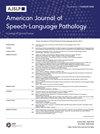用于吞咽困难治疗的神经肌肉电刺激:采用情况、感知障碍和临床实践。
IF 2.3
3区 医学
Q1 AUDIOLOGY & SPEECH-LANGUAGE PATHOLOGY
引用次数: 0
摘要
本研究旨在了解全球采用神经肌肉电刺激(NMES)治疗吞咽困难的情况,确定采用 NMES 的障碍,并描述现有的临床实践。方法 共有 171 名来自不同国际背景的专业人士参与了一项专门开发的在线调查,最终分析包括 122 份回复。调查包括 44 个项目,涉及非屏蔽超声波治疗仪的使用、在吞咽困难治疗中采用非屏蔽超声波治疗仪的障碍以及临床实践。对数据进行了描述性和相关性统计分析。结果在全球范围内,50% 的参与者的工作场所采用了 NMES,在美国则为 42.7%。大多数受访者表示,自我评估的知识水平较高,对学习非监测促进教育系统的兴趣浓厚。在 21 个阻碍采用 NMES 的因素中,19 个因素得到了 50% 以上参与者的认同,其中最多的因素是学术覆盖面不足、缺乏专家认可以及刺激参数的异质性。NMES 的临床应用存在相当大的差异,特别是在使用 NMES 时通常完成的疗程的持续时间、频率和总次数方面。人们对 NMES 表现出的浓厚兴趣与相关研究的日益增多相吻合。然而,障碍的广泛认知和临床应用的巨大差异突出表明,国际社会需要努力制定标准化方案或指南,以确保在临床环境中有效、一致地使用 NMES。本文章由计算机程序翻译,如有差异,请以英文原文为准。
Neuromuscular Electrical Stimulation for Dysphagia Treatment: Adoption, Perceived Barriers, and Clinical Practices.
PURPOSE
This study aims to learn about the global adoption of neuromuscular electrical stimulation (NMES) in managing dysphagia, identify the barriers to its adoption, and describe the existing clinical practices.
METHOD
A total of 171 professionals from various international backgrounds initiated a specially developed online survey, and 122 responses were included in the final analysis. The survey consisted of 44 items related to NMES usage, perceived adoption barriers of NMES in dysphagia management, and clinical practices. The data were subjected to descriptive and correlational statistical analysis.
RESULTS
NMES is adopted by 50% of the participants' workplaces when considering responses globally and 42.7% in the United States. Most respondents reported both high self-assessed knowledge level and high interest in learning about NMES. Among the 21 posed barriers to NMES adoption, 19 were agreed upon by over 50% of participants, with the most reported being insufficient academic coverage, lack of expert endorsement, and heterogeneity in stimulation parameters. There was considerable diversity in the clinical application of NMES, particularly regarding the duration, frequency, and total number of sessions typically completed when using NMES.
CONCLUSIONS
NMES is adopted by half of the facilities and utilized by one third of dysphagia practitioners among the international respondents to this survey. The high interest expressed in NMES parallels the increasing volume of related research. Nonetheless, the widespread recognition of barriers and the substantial variability in clinical application underscore the need for international efforts to establish standardized protocols or guidelines, ensuring its effective and consistent use in clinical settings.
求助全文
通过发布文献求助,成功后即可免费获取论文全文。
去求助
来源期刊

American Journal of Speech-Language Pathology
AUDIOLOGY & SPEECH-LANGUAGE PATHOLOGY-REHABILITATION
CiteScore
4.30
自引率
11.50%
发文量
353
审稿时长
>12 weeks
期刊介绍:
Mission: AJSLP publishes peer-reviewed research and other scholarly articles on all aspects of clinical practice in speech-language pathology. The journal is an international outlet for clinical research pertaining to screening, detection, diagnosis, management, and outcomes of communication and swallowing disorders across the lifespan as well as the etiologies and characteristics of these disorders. Because of its clinical orientation, the journal disseminates research findings applicable to diverse aspects of clinical practice in speech-language pathology. AJSLP seeks to advance evidence-based practice by disseminating the results of new studies as well as providing a forum for critical reviews and meta-analyses of previously published work.
Scope: The broad field of speech-language pathology, including aphasia; apraxia of speech and childhood apraxia of speech; aural rehabilitation; augmentative and alternative communication; cognitive impairment; craniofacial disorders; dysarthria; fluency disorders; language disorders in children; speech sound disorders; swallowing, dysphagia, and feeding disorders; and voice disorders.
 求助内容:
求助内容: 应助结果提醒方式:
应助结果提醒方式:


